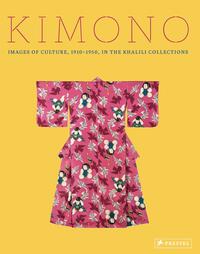
This dazzling volume explores the Khalili Collection of kimono’s powerful selection of modernity and propaganda pieces from the first half of the twentieth century.One of the most recognizable aspects of Japanese culture, the kimono was once a vital everyday garment worn by adults and children across Japan. While the basic form of the T-shaped, straight-seamed, front-wrapping kimono has changed very little over the centuries, the onset of the twentieth century ushered in a variety of influences, including western-style clothing; a desire for practicality and comfort; the emergence of Japanese identity in the wake of World War II; pop culture; and high fashion. Featuring more than two hundred full color photographs and insightful commentary by Jacqueline Atkins, renowned textile historian, this volume introduces readers to the concepts of Omoshirogara kimono or “amusing/interesting garments,” and Sensōgara, or war/propaganda garments. It details changes in fabrics and production techniques and explores differences across gender and age. A vibrant survey of an important and rarely covered aspect of Japanese culture, this volume chronicles the kimono’s dynamic role against the backdrop of social, cultural, and global change.